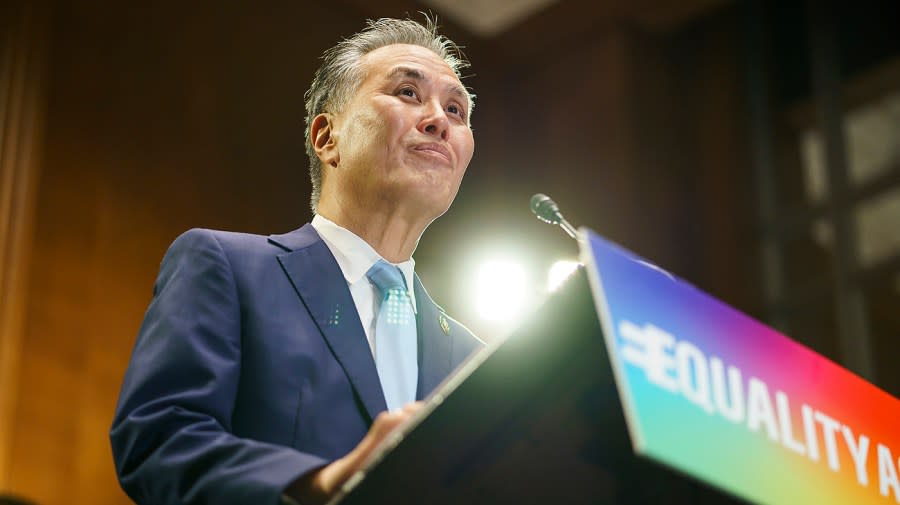Japanese internment camp Day of Remembrance a time to ‘reckon with imperfections’

- Oops!Something went wrong.Please try again later.
Rep. Mark Takano’s (D-Calif.) grandfather came to America in 1916, at the age of 18, in the hopes of achieving his own American Dream.
Instead, in 1942, he and his wife were incarcerated in a Japanese internment camp.
“Here’s my grandfather and my grandmother, who was American born, who were punished for something they never did wrong, and they suffered mightily,” Takano told The Hill.
Takano is among thousands of Americans on Monday recognizing a Day of Remembrance for the more than 120,000 Japanese Americans who were incarcerated in internment camps during World War II.
Following the attack on Pearl Harbor in 1941, widespread anti-Japanese sentiment spread throughout the nation, and on Feb. 19, 1942, President Franklin D. Roosevelt signed Executive Order 9066, leading to the forced incarceration of civilians of Japanese ancestry.
But for Takano, this executive order marks a moment when the Constitution was not upheld.
“The Constitution didn’t fail us, leadership failed us,” Takano said. “The Constitution gave us a lot of tools. But without leadership, the Constitution is just a piece of paper.”
The incarceration saw Japanese families lose some $400 million in property, according to the World War II museum, but the impact was deeper than financial loss — and continues to affect generations today.
“Besides the monetary sort of aspect, there’s also the cultural and historical aspect,” said Matthew Weisbly, education programs manager for the Japanese American Citizens League.
“Japanese Americans were told they couldn’t speak Japanese. They couldn’t practice Japanese tradition and culture. Even sports like sumo were banned, religions were changed,” he added.
Weisbly, who is one-quarter Japanese, said his grandfather was one of the thousands incarcerated at the time. Though his grandfather entered incarceration as a Buddhist, Weisbly said, he left as an atheist.
“So many of us now, generations later, don’t have that connection to language and history and culture like some other Asian American communities do because there were those years where it was seen as taboo to be Japanese,” Weisbly said.
“In the years after the war, the children and grandchildren were taught to be American because their parents were still fearful that something like that could happen again.”
This year’s Day of Remembrance comes at a time of high anti-Asian American Pacific Islander (AAPI) hate, making Monday’s reflection even more important, said John C. Yang, president and executive director of Asian Americans Advancing Justice.
This rising anti-AAPI sentiment aligned with the COVID-19 pandemic, and since 2020, more than 11,000 acts of hate against AAPI community members have been reported, according to a 2023 report by Stop AAPI Hate.
“The Japanese American community always talks about the Day of Remembrance because they never want this to happen again,” Yang told The Hill. “It is important for all of us to remember that it’s not simply a point in history. It is a lesson that we could learn to bring with us today.”
In some ways, Yang said, the nation has reckoned with the history of internment camps, but anti-AAPI hate indicates it has been an uneven reckoning.
In 1948, Congress paid $38 million in reparations and an additional $20,000 forty years later to survivors who had been detained in the camps.
Takano is now working to take additional steps.
In 2021, he reintroduced the Korematsu-Takai Civil Liberties Protection Act. The legislation would prohibit the imprisonment or detainment of American citizens based on their race, religion, nationality, sex, gender identity, sexual orientation, ethnicity or disability.
And his family’s history continues to affect Takano’s personal career.
His three great-uncles served in the U.S. Army, and his great-uncle Manzo “Mon” Takahasi lost his life in Italy just a few weeks before D-Day at only 26 years old. Takano is now the top Democrat on the Veterans’ Affairs Committee.
But Takano hasn’t stopped there. He has also been fighting to honor Fred Korematsu, who refused to comply with Roosevelt’s executive order and appealed it before the Supreme Court.
Though Korematsu received the Presidential Medal of Freedom from former President Clinton in 1988, Takano has since introduced legislation to posthumously award Korematsu the Congress’s medal of honor.
“The Day of Remembrance is a useful tool,” Takano said. “The history is not about finding justifications to hate or to stew in resentment, but to reckon with the imperfections and to also note the progress that we’ve made.”
For the latest news, weather, sports, and streaming video, head to The Hill.
